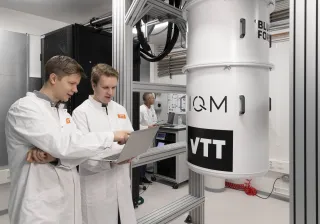The fact that Finland has a 50-qubit domestic quantum computer is quite impressive. However, as a critical researcher I can’t help but ask: Why do we actually have this computer? As I considered that question, I realised that it is linked to three questions that people keep asking me in my role as a professor in quantum computing. Those three questions might provide us with an answer to the original question.
The most common question is probably: How can quantum computers be beneficial?
If you were a student in my quantum computing course, my answer would be “You tell me!” By this, I mean that researchers from my generation are still focusing on research questions related to building quantum computers, developing algorithms and software as well as different methods needed to increase the size and enhance the operation of a quantum computer.
We could compare the situation to 1995. I was a high school student using the internet for the first time. I didn’t do anything useful – I just followed different links. Reflecting on Finland 10, 20 and 30 years later, we can see that the internet has enabled many possibilities that were not planned back then. Quantum scientists are responsible for training the next generation of researchers.
Being a quantum researcher is very interesting in these times, but it may be even more exciting to be a student in the quantum sector. The students of today are tomorrow’s researchers. They will be the ones showing us what a quantum computer can really do. I doubt that we can even imagine all the applications that a quantum computer might have in the future.
The second question is: Why is a quantum computer faster than an ordinary computer?
My answer to this is that a quantum computer is not always faster. Computers help with calculations, but they are not the only factor determining how fast a calculation is made. They key is learning about the complexity of computing problems and finding the best way to solve them.
We can use an imaginary Computing World to better understand the big picture. In this world, easy problems are located in meadows and difficult problems are on mountain tops. A difficult problem can become easy if we know a good route. Algorithms handle the routes in our Computing World. The tools used for calculation are vehicles in this metaphor. The computer is a bicycle. It’s reliable and durable. A quantum computer is not a car but more like a float plane in this metaphor. A float plane allows you to quickly hop from one lake to another, but you need knowledge of the lakes and terrain in order to do this. You can’t just fly anywhere, because there has to be a lake at the destination. A bicycle and a float plane have completely different requirements for their routes. In the same manner, an ordinary computer and a quantum computer function in different ways and are good for different purposes.
We don’t know very much about the Computing World. In the best-case scenario, it would be like Central Finland, which has lakes everywhere. That would allow a float plane to fly wherever it wanted. The Computing World might also be like Satakunta, a region in Western Finland, where a float plane is useful but can’t go everywhere. At this point, I should also mention that the LUMI supercomputer can’t be compared to a bicycle. It’s more like the Harley Davidson of the computing world. If you lived in the town of Pori and had a Harley and a float plane, you would probably use both of them. In the worst case, the Computing World would be like the Sahara Desert. In that case, you would have very little use for a quantum computer. Fortunately, we already have signs that our Computing World is not the Sahara Desert.
Is there any use having a float plane if you don’t know whether there are any lakes in the area? If you aren’t familiar with the terrain, you can do some reconnaissance with a bicycle. However, using a float plane to survey the area from above would be faster. Fuel capacity might be a restricting factor that forces you to keep returning to the take-off lake, but the terrain would gradually become more familiar. A quantum computer also makes us look for new ways of deciding which computing problems we can solve and how to solve them.
The third question is: Can an ordinary person understand quantum physics?
The answer to this is clear: Yes, they can. An unnecessary sense of mystery has developed around quantum physics and – unfortunately – the idea that quantum physics is incomprehensible is also quite common. An ordinary person can understand quantum physics. It's difficult, but every one of us has studied difficult topics in the past. The difficulty of learning basic quantum physics is not the complexity of the subject but the fact that the reality of quantum physics is so different than that of our everyday world.
The more interesting question is whether an ordinary person needs to study quantum physics. The answer to this is: Think about your normal daily life. You wake up in the morning. You might be hungry or thirsty, but you glance at the news or answer a message before breakfast. Many of us spend the rest of the day working with other information, communication and analysis. The lucky ones also get to do some programming. Our daily life revolves around information. Our society is based on information.
How does quantum physics fit into the picture? Information always requires some physical vehicle – it cannot occur on its own. Information is quantum information when the vehicle is a quantum physical system. Since quantum physics is physics at the fundamental level, the information processing rules are ultimately based on quantum physics. Rather than being a remote or esoteric concept, quantum information is a fundamental form of information.
In order to develop our information-based society, the next logical step is to increase our understanding of quantum physics, develop quantum technology applications and learn to use quantum computers in a beneficial way. This is a shared opportunity, and a wide variety of competence and diverse perspectives will be needed to realise its potential. Every interested person has a place in this development process.
Professor Teiko Heinosaari, University of Jyväskylä
Teiko Heinosaari is a professor in quantum computing at the University of Jyväskylä’s Faculty of Information Technology. He researches the achievement of quantum benefit in information processing and also develops new methods of teaching quantum computing.
This article is based on a speech made by Heinosaari at the 50-qubit quantum computer launch event held in Dipoli on 4 March 2025.






